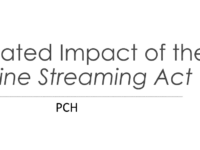ChatGPT burst onto the public scene late last year, giving artificial intelligence its “aha moment” for many people. AI is now seemingly everywhere, attracting enormous attention and excitement alongside concerns, legal threats and talk of regulation. The potential of AI is evident to just about everyone, but the challenges associated with bias, copyright, privacy, misinformation and more can’t be ignored. Cohere AI is a Canadian-based AI firm that is widely viewed as one of Canada’s AI stars for its large language models that enable companies of all sizes to integrate AI technologies. Aidan Gomez, who worked on the “T” in ChatGPT, is the co-founder and CEO of Cohere AI. He joins the Law Bytes podcast to talk about AI and his views on the myriad of emerging legal and regulatory issues.

Fair Dealing by Giulia Forsythe (CC BY-NC-SA 2.0) https://flic.kr/p/dRkXwP
Copyright
Bill C-11 Estimates Revealed: Internal Government Documents Show No Impact on Net Employment, Admit Streamers Already Invest Millions in “Unofficial Cancon”
The government’s support for Bill C-11 has often been framed on economic terms with Canadian Heritage Minister Pablo Rodriguez arguing that the bill will “create good jobs for Canadians in the cultural sector”. I’ve long maintained the government’s claims that the bill will generate billions of dollars in new money was massively exaggerated and that a far more likely scenario would be that the bill would simply lead to a reshuffling of existing expenditures.
Using the Access to Information Act, I have now obtained a copy of the government’s internal estimates for the economic and production impact of Bill C-11 (methodology, memorandum, PPT), which confirm many of my suspicions. While the government is pinning its hopes on massive spending from Internet streamers such as Netflix, it admits that even if the bill did not pass it would not affect net new employment in the sector. Moreover, internally the government recognizes the claim that Netflix and foreign streamers don’t contribute to Canadian content is false, as it has identifies a new category of “unofficial Cancon” which would qualify as Cancon under every measure but for the fact that it is owned by companies like Netflix and Disney. And as for the payments from social media companies that the government insists are so essential that it has fought for years to include user content regulation in the bill? The estimated economic benefit represents just one percent of its total projection for Bill C-11 with pure guesswork about what percentage of content on the platforms might require contributions.
Why the Senate Should Restore the User Content Amendment and Send Bill C-11 Back to the House of Commons
Bill C-11 took a major step forward late last week as the government cut off debate yet again and forced a vote on an amended bill that rejected the Senate’s fix to concerns about user content regulation. The vote has sparked heated debates on social media, including mistaken insistence by some that the bill does not affect user content (it clearly does) or that it will censor what Canadians can say online (it will not). The reality is that Bill C-11 has important freedom of expression implications not because it will limit people’s ability to speak, but because government regulation may affect their ability to be heard. Given those implications – and the government’s inability to cite a credible justification for rejecting an amendment to address the problem by excluding user content from potential regulation – I believe the Senate should send the bill back to the House once more by restoring the amendment.
The Latest Bill C-11 Debate: Sacrificing Freedom of Expression for Quebec Culture Lobby Support
The Bill C-11 debate continued for hours in the House of Commons yesterday with a dispiriting discussion featuring MPs from all sides ignoring or exaggerating the implications of the bill. The debate often seemed to gravitate to two polar opposites: either the bill is China or North Korea-style censorship or it has no implications for freedom of expression and the regulation of user content. Both are false. To the claims of censorship, Bill C-11 is not China, Russia or Nazi Germany. As I’ve stated many times, it does not limit the ability to speak, but could impact the ability to be heard. That raises important implications for freedom of expression but it does not turn Canada into China. To the claims that user content regulation is excluded from the bill, Section 4.1(2)(b) and 4.2.2 clearly scope such content into the bill, an interpretation that has been confirmed by dozens of experts and the former Chair of the CRTC. Liberal and NDP MP claims to the contrary should be regarded as disinformation, a deliberate attempt to spread false information. Indeed, the Senate proposed a fix. The government rejected it. That was supposed to be the focus of the debate, yet Liberal MPs such as Kevin Lamoureux falsely claimed that there is no there there.
The Biden Visit to Canada: Why Digital Policy is Emerging as a Serious Trade Tension
The U.S. President Joe Biden’s visit to Ottawa this week has begun to place the spotlight on the mounting tensions over digital policy. For months, Canadian officials have not only been dismissive of the issue, but – as this week’s fishing expedition into Google and Facebook demonstrates – have not shied away from making the issue front and centre. I have been posting about trade-related risks with Canadian digital policy for months, noting that the risks are real and could result in billions in retaliatory tariffs that hits some of Canada’s most sensitive sectors. Indeed, this issue has been raised at every major meeting between senior trade officials for the past year. Is retaliation likely to happen? Certainly not immediately, but the longer the issues fester, the greater the impediment to advancing Canadian trade priorities. As Scottie Greenwood notes, “these are top-of-mind issues. They are not a small obscure issue.”











